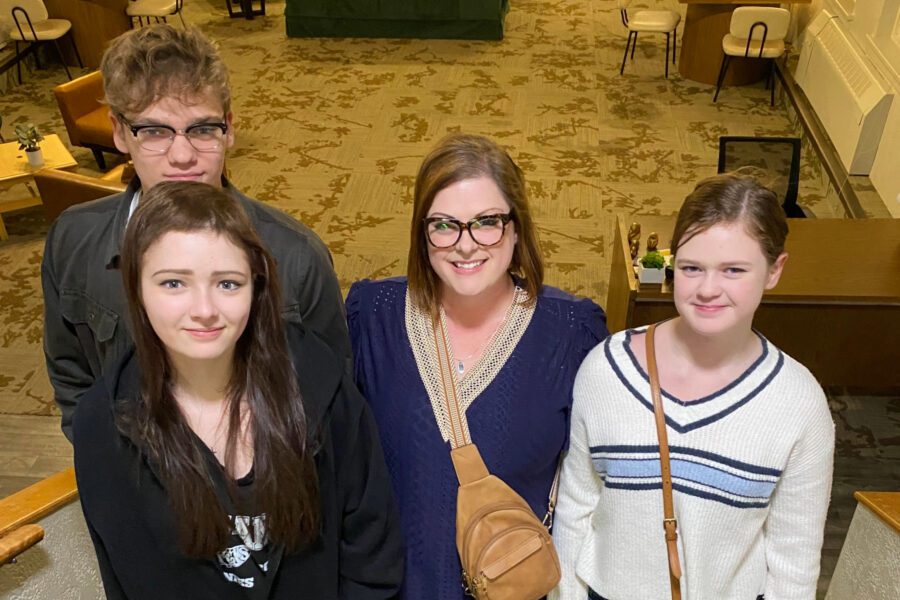
As we approach the holiday season once again, our thoughts and activities often center around our families. How fitting, for the Bible begins with the story of the human family. Genesis describes family life in rich detail. In fact, it was this unit that became the prototype for all future social relationships.
The families of Adam, Noah, Abraham, Isaac and Jacob make up most of the content of the first book of Holy Scripture. This fact is no small matter. The Bible does not begin with a theological explanation of God, nor a philosophical description of man, nor even a list of expectations for those who mine the pages of sacred Scripture. Arguably, the dominant theme as the Bible opens is the family. Once God is established as the timeless, eternal Creator (“In the beginning God created. …” — Genesis 1:1), and once creation is set in motion in the first chapter of Genesis, the book proceeds with 49 additional chapters of family life. Every page contains a mixture of ordinary and dramatic circumstances experienced by individuals who are presented to us in families.
Biblical families, like every family that has ever existed, are remembered for both their contributions and their disappointments. I have yet to meet a perfect family. As I search the pages of Scripture, I find the same to be true there. The sin that occurred in Genesis 3 tainted every individual and family that followed. Adam and his family were known for the kind of work they did: caring for God’s creation. However, pride, jealousy and sin soon destroyed their idyllic home and small community. Noah and his family were known for being righteous, Godly and obedient. Nonetheless, near the end of Noah’s life, his sons were involved in an act of disrespect that resulted in a tragic curse. Abraham, Isaac and Jacob formed a three-generation family that would be remembered for its faith for centuries to come. Unfortunately, they would also be remembered for multiple acts of deception that marked their family line. Families are like that. They teach and nurture us and, because of fallen human nature, sometimes embarrass and shame us. Despite the imperfections, we dare not miss the family’s priority in the eyes of God. The family was God’s design, His first social institution, and His intention for how humans would live and thrive in the world.
Families make several important contributions to their members and to wider society. Sociologists often refer to these as social functions. Examples abound in the book of Genesis. Adam and Eve are remembered for the family function of reproduction. Noah protected his family from the flood that engulfed the world. Abraham passed on his faith and modeled a personal relationship with God. The patriarch Jacob rallied his sons to provide food for their entire extended family. Taken together, these early families operated in ways that contributed to society and fostered social order. Reproduction, protection, matters of faith and economic provision continue to be significant social functions carried out by families. God had a practical purpose in mind when He designed us to live in families. Family life was neither arbitrary nor the result of a cosmic accident. Personal and social good were part of God’s family plan.
Is it any wonder, then, that the Enemy — known throughout Scripture as Satan and referred to in Genesis as “the serpent” (3:1) — would marshal all his forces to attack what God valued, prioritized and intended for human flourishing? What God created for noble purposes, the Enemy sought to degrade and destroy. The reader does not get too far in Genesis before encountering murder, polygamy, deception, disrespect, betrayal, promiscuity and more. One might argue that not much has changed today. Gender, marriage, childbearing and family life — all parts of God’s “very good” creation (Genesis 1:31) — remain favorite targets of the Adversary. The consequences of the relentless assault on family life are catastrophic, wreaking havoc in communities everywhere.
Yet, despite these tragic consequences and the distortion caused by sin, the family remains one of the most distinguishing features of social life. There is not a people group known to anthropology or sociology that does not exist in families. Human beings continue to form and live in family units. What began in Genesis became the pattern for all generations to follow. People became known for whose son or daughter they were, what tribe they belonged to and who their ancestors were. Families carried with them identity, social status and distinction. For example, to be from the tribe (i.e., family) of Judah made one distinct from those who came from the tribe (i.e., family) of Levi. The former became known for its royal line, whereas the latter became known for its priestly line. Family names still carry with them meaning among community members to this very day.
Families matter. They always have. Social order, civility and identity are products of healthy family life. Genesis offers us a view of the practical plan and immeasurable possibilities inherent in this first social institution.
So when you gather with your tribe around the Thanksgiving dinner table, be sure to thank God for His design and for your own family. This was all God’s idea from the start.
Adapted From Dr. Kent R. Olney’s Book, Sixty-Six. Wilmore, KY; Francis Asbury Press, 2023. Chapter 1.





